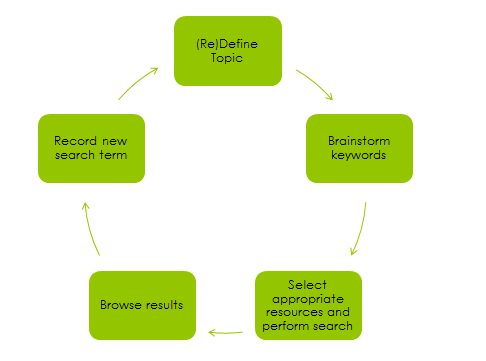The Research Process
Don't be discouraged if your first search does not bring you to the most relevant resources- the research process is iterative. You must actively browse through your results, make note of the terminology used by experts in the literature, and modify your search. This will lead you to the results you are looking for!
When we search with keywords, we are using our natural language. Keywords are very flexible and are great for capturing the details of our searches. You may also want to use keywords to broadly survey what literature exists on a topic.
Search Tips
Search Tips
- Combining terms with AND narrows your search.
- Combining terms with OR broadens your search.
- Put quotation marks around your keywords when you want to keep the phrase exactly in the order that you typed it (ie. "water flea")
- Use an asterisk at the end of a root word to capture all variations (ie. grow* would retrieve grow, growing, growth, etc.)
- Add the keyword textbook to your Encore search if you are specifically looking for textbooks containing information about your topic.
- If you are finding journal articles that are too complex, try using the keyword review in your search. This may bring up some helpful overviews of the literature on a particular topic.
- When you do find a great article, examine the works cited list
Selecting Keywords
Selecting Keywords
When we search with keywords, we are using our natural language. Keywords are very flexible and are great for capturing the details of our searches. You may also want to use keywords to broadly survey what literature exists on a topic.
However, searching this way can give too many or irrelevant results because different disciplines use terms differently. We may also miss out on finding resources because we are not using the same words as the author. When searching with keywords, it is therefore important to keep in mind:
- Variations in spelling, acronyms
- Synonyms (We must think of all of the words an author might use to describe a topic!)
- Keyword Worksheet
Use this document to think through your topic and choose keywords that will help you search for information
CRAAP Test
The CRAAP Test can help you evaluate documents you find on the web, books, or even websites that discuss the topic you are researching. Advances in technology now allow almost anyone to post information in various formats on the internet whether the poster is an expert, a student or someone who wants to influence the reader for any number of reasons. Using this set of guidelines can help you determine whether or not the information is likely to be accurate and reliable. If there are too many unknown factors or red flags, you may want to pass up certain sources of information and continue to look for more reliable ones.
Contributor
Gwen Cunningham
Gwen Cunningham
Gwen Cunningham is the Science Librarian at St. Lawrence University. Gwen has an M.L.I.S. from the University of Rhode Island and a B.A. from Mount Holyoke College in Massachusetts. She comes to SLU with past experience at Brown University’s Center for Digital Initiatives as well as the Providence Athenæum.
Gwen provides research assistance and support to both faculty and students. She is available to provide classroom instruction to the science departments on campus. She can be found at the Launders Science Library in Madill Hall which houses the University’s science collections and GIS services.


